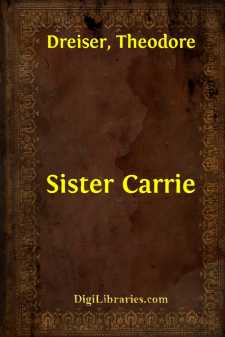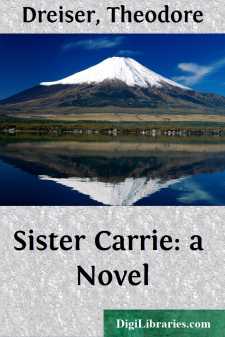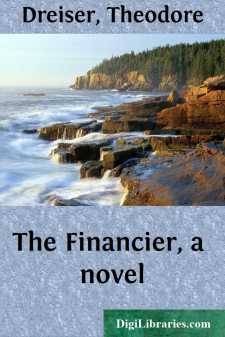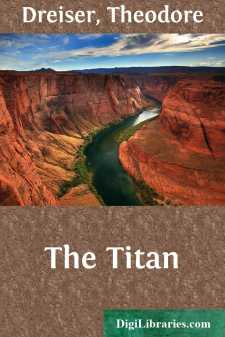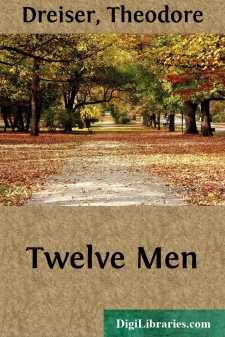Categories
- Antiques & Collectibles 13
- Architecture 36
- Art 48
- Bibles 22
- Biography & Autobiography 813
- Body, Mind & Spirit 142
- Business & Economics 28
- Children's Books 17
- Children's Fiction 14
- Computers 4
- Cooking 94
- Crafts & Hobbies 4
- Drama 346
- Education 46
- Family & Relationships 57
- Fiction 11829
- Games 19
- Gardening 17
- Health & Fitness 34
- History 1377
- House & Home 1
- Humor 147
- Juvenile Fiction 1873
- Juvenile Nonfiction 202
- Language Arts & Disciplines 88
- Law 16
- Literary Collections 686
- Literary Criticism 179
- Mathematics 13
- Medical 41
- Music 40
- Nature 179
- Non-Classifiable 1768
- Performing Arts 7
- Periodicals 1453
- Philosophy 64
- Photography 2
- Poetry 896
- Political Science 203
- Psychology 42
- Reference 154
- Religion 513
- Science 126
- Self-Help 84
- Social Science 81
- Sports & Recreation 34
- Study Aids 3
- Technology & Engineering 59
- Transportation 23
- Travel 463
- True Crime 29
Theodore Dreiser
Theodore Dreiser (1871–1945) was a prominent American novelist and journalist, known for his naturalistic writing style that often depicted the harsh realities of life. His most famous works, including "Sister Carrie" (1900) and "An American Tragedy" (1925), explored themes of ambition, materialism, and the influence of environment and heredity on human behavior. Dreiser's unflinching portrayal of social issues and his criticism of American capitalism made him a significant, albeit controversial, figure in early 20th-century literature.
Author's Books:
Sort by:
by:
Theodore Dreiser
CHAPTER I One morning, in the fall of 1880, a middle-aged woman, accompanied by a young girl of eighteen, presented herself at the clerk's desk of the principal hotel in Columbus, Ohio, and made inquiry as to whether there was anything about the place that she could do. She was of a helpless, fleshy build, with a frank, open countenance and an innocent, diffident manner. Her eyes were large and...
more...
by:
Theodore Dreiser
Chapter I THE MAGNET ATTRACTING: A WIFE AMID FORCES When Caroline Meeber boarded the afternoon train for Chicago, her total outfit consisted of a small trunk, a cheap imitation alligator-skin satchel, a small lunch in a paper box, and a yellow leather snap purse, containing her ticket, a scrap of paper with her sister's address in Van Buren Street, and four dollar in money. It was in August, 1889....
more...
by:
Theodore Dreiser
Chapter I. THE MAGNET ATTRACTING—A WAIF AMID FORCES When Caroline Meeber boarded the afternoon train for Chicago, her total outfit consisted of a small trunk, a cheap imitation alligator-skin satchel, a small lunch in a paper box, and a yellow leather snap purse, containing her ticket, a scrap of paper with her sister's address in Van Buren Street, and four dollars in money. It was in August,...
more...
by:
Theodore Dreiser
Chapter I The Philadelphia into which Frank Algernon Cowperwood was born was a city of two hundred and fifty thousand and more. It was set with handsome parks, notable buildings, and crowded with historic memories. Many of the things that we and he knew later were not then in existence—the telegraph, telephone, express company, ocean steamer, city delivery of mails. There were no postage-stamps or...
more...
by:
Theodore Dreiser
Chapter I The New City When Frank Algernon Cowperwood emerged from the Eastern District Penitentiary in Philadelphia he realized that the old life he had lived in that city since boyhood was ended. His youth was gone, and with it had been lost the great business prospects of his earlier manhood. He must begin again. It would be useless to repeat how a second panic following upon a tremendous...
more...
by:
Theodore Dreiser
Peter In any group of men I have ever known, speaking from the point of view of character and not that of physical appearance, Peter would stand out as deliciously and irrefutably different. In the great waste of American intellectual dreariness he was an oasis, a veritable spring in the desert. He understood life. He knew men. He was free—spiritually, morally, in a thousand ways, it seemed to me. As...
more...



